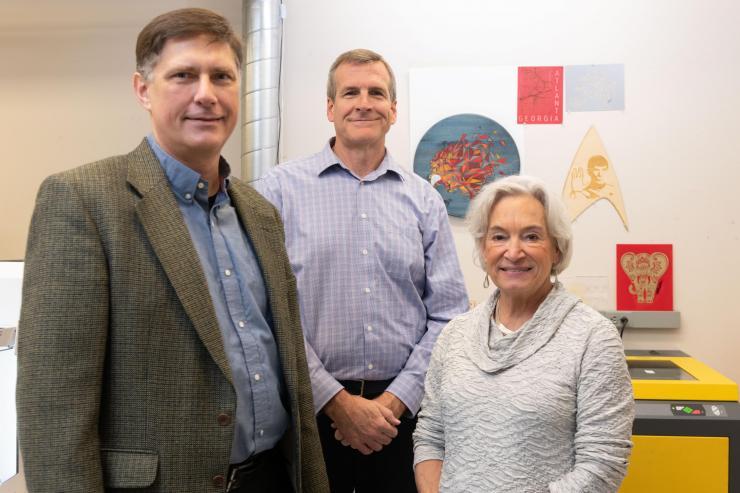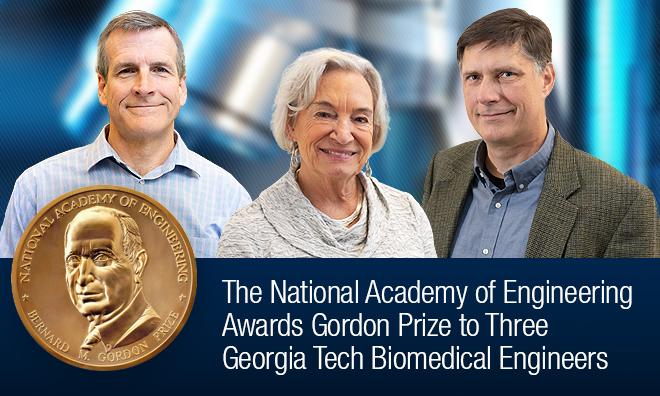2019 Bernard M. Gordon Prize Awarded to Georgia Tech and Emory University Educators
Jan 09, 2019 — Atlanta, GA

(Left-to-right) Joseph Le Doux, Paul Benkeser, and Wendy Newstetter, from the Wallace H. Coulter Department of Biomedical Engineering at Georgia Institute of Technology and Emory University, are awarded the 2019 Bernard M. Gordon Prize from the National Academy of Engineering.
The National Academy of Engineering announced that the 2019 Bernard M. Gordon Prize for Innovation in Engineering and Technology Education will be awarded to Wendy Newstetter, Joseph Le Doux, and Paul Benkeser from the Wallace H. Coulter Department of Biomedical Engineering at Georgia Institute of Technology and Emory University, "for fusing problem-driven engineering education with learning-science principles to create a pioneering program that develops leaders in biomedical engineering." The $500,000 annual award recognizes new methods and concepts in education aimed at developing engineering leaders.
The Gordon Prize ceremony will be held at the Academy of Medicine at Georgia Tech in Atlanta on Tuesday, May 14, 2019.
"I am honored to recognize these educators who have created a remarkably innovative biomedical engineering program to create future leaders in the field," said NAE President C. D. Mote, Jr. "The Gordon Prize will help advance their program's global impact on one of society's great challenges - developing engineering leaders in service of human health and well-being."
The Wallace H. Coulter Department of Biomedical Engineering is housed at both Georgia Tech and Emory. With the help of scientists who specialize in learning and engineering educators, the program is designed to foster the next generation of leaders in biomedical engineering who will play an integral role in improving health and well-being worldwide. This groundbreaking program pioneered bringing best practices in education and learning to engineering. As part of the curriculum, students experience problem-driven learning (PDL), which replicates in class the industry environment that graduates will face as future industry leaders.
Wendy Newstetter is assistant dean for educational research and innovation in the College of Engineering at Georgia Tech. She was a founding faculty member in the Coulter Department of Biomedical Engineering, where she was a cognitive and learning scientist (2000-2012). During this time, she worked with faculty to build an innovative curriculum both based on the principles of problem-based learning (PBL) and informed by the ethnographic studies she and her research team conducted in biomedical engineering research laboratories. The objective was to enhance fidelity between the authentic, unscripted learning environment of a research lab and the synthetic or designed environment of a classroom. What started as a single PBL class has grown to a suite of carefully designed engineering learning environments collectively referred to as PDL. This unique collection of classroom environments was recognized in 2013 with the Georgia Regents' Teaching Excellence Award.
Joseph Le Doux is associate chair for undergraduate learning and experience and an associate professor in the Coulter Department of Biomedical Engineering. He joined the department in 1999 as an assistant professor because he was inspired by the vision of the department's founding chair, Don Giddens, to educate engineers who were integrative thinkers who could operate seamlessly between the engineering and life sciences. As part of his contribution to the department's efforts to realize this vision, Le Doux invented the problem-solving studio approach for teaching engineering, which he implemented in 2008 in a sophomore-level introductory course. He has since worked with faculty and learning-science colleagues to refine and adapt the approach for use in multiple courses in biomedical and other engineering disciplines.
Paul Benkeser is a professor and senior associate chair in the Coulter Department of Biomedical Engineering. A member of the Georgia Tech faculty since 1985, he was one of the founding faculty of the Coulter Department in 1998 and served as its first associate chair for undergraduate studies. His early research interests were in therapeutic and diagnostic applications of ultrasound. After joining the department, he redirected his energies toward enhancing undergraduate biomedical engineering education, with particular interests in integrating problem-driven learning and global experiential learning opportunities in the curriculum. His research and education endeavors have been funded by grants from NIH, NSF, the U.S. Department of Veterans Affairs, and the Whitaker Foundation.
###
The Gordon Prize was established in 2001 as a biennial prize acknowledging new modalities and experiments in education that develop effective engineering leaders. Recognizing the potential to spur a revolution in engineering education, NAE announced in 2003 that the prize would be awarded annually.
The mission of the NAE is to advance the well-being of the nation by promoting a vibrant engineering profession and by marshalling the expertise and insights of eminent engineers to provide independent advice to the federal government on matters involving engineering and technology. The NAE is part of the National Academies of Sciences, Engineering, and Medicine, an independent, nonprofit organization chartered by Congress to provide objective analysis and advice to the nation on matters of science, technology, and health.
Contacts:
Walter Rich
404-385-2416
wrich@gatech.edu
Holly Korschun
404-727-3990
hkorsch@emory.edu
Brandon Green
Communications/Media Specialist
202-334-2226
email BGreen@nae.edu
Deborah M. Young
Program Officer
202-334-1266
e-mail DYoung@nae.edu

"I am honored to recognize these educators who have created a remarkably innovative biomedical engineering program to create future leaders in the field," said the National Academy of Engineering (NAE) President C. D. Mote, Jr.
Wallace H. Coulter Department of Biomedical Engineering




